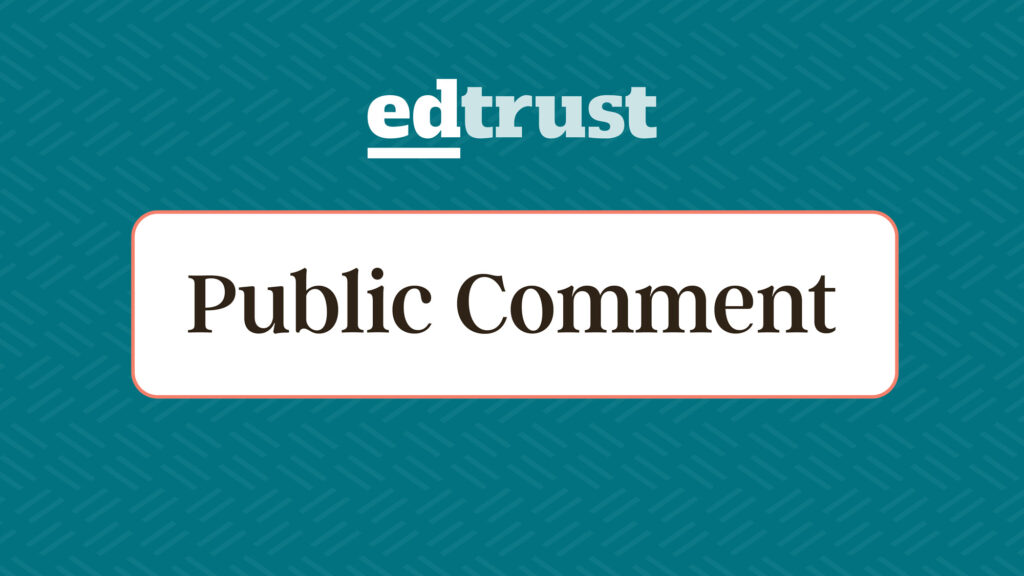EdTrust Comment on Secretarial Priorities
EdTrust comments on proposed supplemental priorities focusing on evidence-based literacy, educational choice, and returning education to the states

June 20, 2025
Zachary Rogers
U.S. Department of Education
400 Maryland Ave SW, Room 7W213
Washington, DC 20202-6450
Re: Comment on Priorities, Requirements, Definitions, and Selection Criteria: Evidence-Based Literacy, Education Choice, and Returning Education to the States Docket ID ED-2025-OS-0020
Dear Mr. Rogers:
We provide these comments on the Department’s proposed supplemental priorities focusing on evidence-based literacy, educational choice, and returning education to the states. While these areas represent important policy considerations, the proposed approaches require significant modifications to ensure they effectively serve all students, particularly those who have been historically underserved. Our comments outline both opportunities for federal investment and the crucial changes necessary to strengthen educational equity.
We align with the Department’s commitment to supporting high-quality literacy instruction grounded in research. Recent NAEP results underscore the need for increased, sustained investment in literacy to accelerate learning, particularly for students of color and students from low-income backgrounds. Federal investment in literacy represents a critical opportunity to transform educational outcomes for students who need it most, but it requires thoughtful implementation to ensure that federal grants truly serve all students.
The Department’s approach to educational choice should focus on strengthening public education rather than diverting resources to private alternatives. Federal ESSER funds demonstrated success in addressing pandemic-related learning challenges through public school investments. The Department should prioritize allocating additional resources to sustain these evidence-based initiatives in public schools.
Public School Investment: Public dollars should be invested in public schools, which serve over 90% of America’s students, cannot discriminate in admissions, and provide essential protections and services for all learners, including students with disabilities. Diverting public funds to private school vouchers undermines these protections while draining resources from schools that serve the most vulnerable students. Moreover, voucher programs fail to provide meaningful choices for many students, particularly students with disabilities, who must waive federal protections to attend private schools; rural students, who lack access to nearby private schools; and students from low-income backgrounds, whose families can’t afford to pay the gap between voucher benefits and tuition — all while providing lower academic outcomes for participating students.
Meaningful Educational Options: True educational choice means ensuring that public schools can offer high-quality dual enrollment, work-based learning, and apprenticeship programs that increase access to higher education and in-demand careers, along with high-impact tutoring programs with proven effectiveness, so that all students have the educational opportunities they need to make real choices about their future.
While states play an important role in education governance, the Department’s priorities as written risk weakening federal civil rights enforcement and accountability measures that protect student rights. This approach risks abandoning the federal government’s constitutional responsibility to ensure equal educational opportunity for all students.
Balancing State Capacity with Federal Oversight: While federal funding should build state education agency capacity to support evidence-based practices in partnership with local communities, the federal government retains a critical role in ensuring that states adequately address the needs of all students. We urge the Department to clearly articulate how it will support state capacity building while ensuring continued compliance with federal laws, including essential civil rights protections.
Maintaining Public Accountability: Federal grants must continue to flow exclusively to public and non-profit organizations that demonstrate a transparent commitment to serving all students equitably. Any reduction in federal oversight or accountability requirements represents a step backward for educational equity.
While we recognize the importance of evidence-based literacy instruction, meaningful educational opportunities, and appropriate state-federal partnership, the Department’s current approach could undermine our shared goal of meeting the urgent needs of students, particularly those who have been historically underserved. To ensure that all students can read, we need not just strong, evidence-based literacy policies, but also strong continued investments in public schools and educators tasked with supporting students’ literacy development. Federal education policy must prioritize equity, civil rights protection, and public school investment over privatization and deregulation. We urge the Department to revise these priorities to center the needs of all students and strengthen public education.
Sincerely,
EdTrust